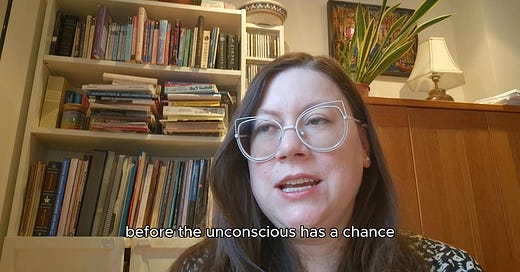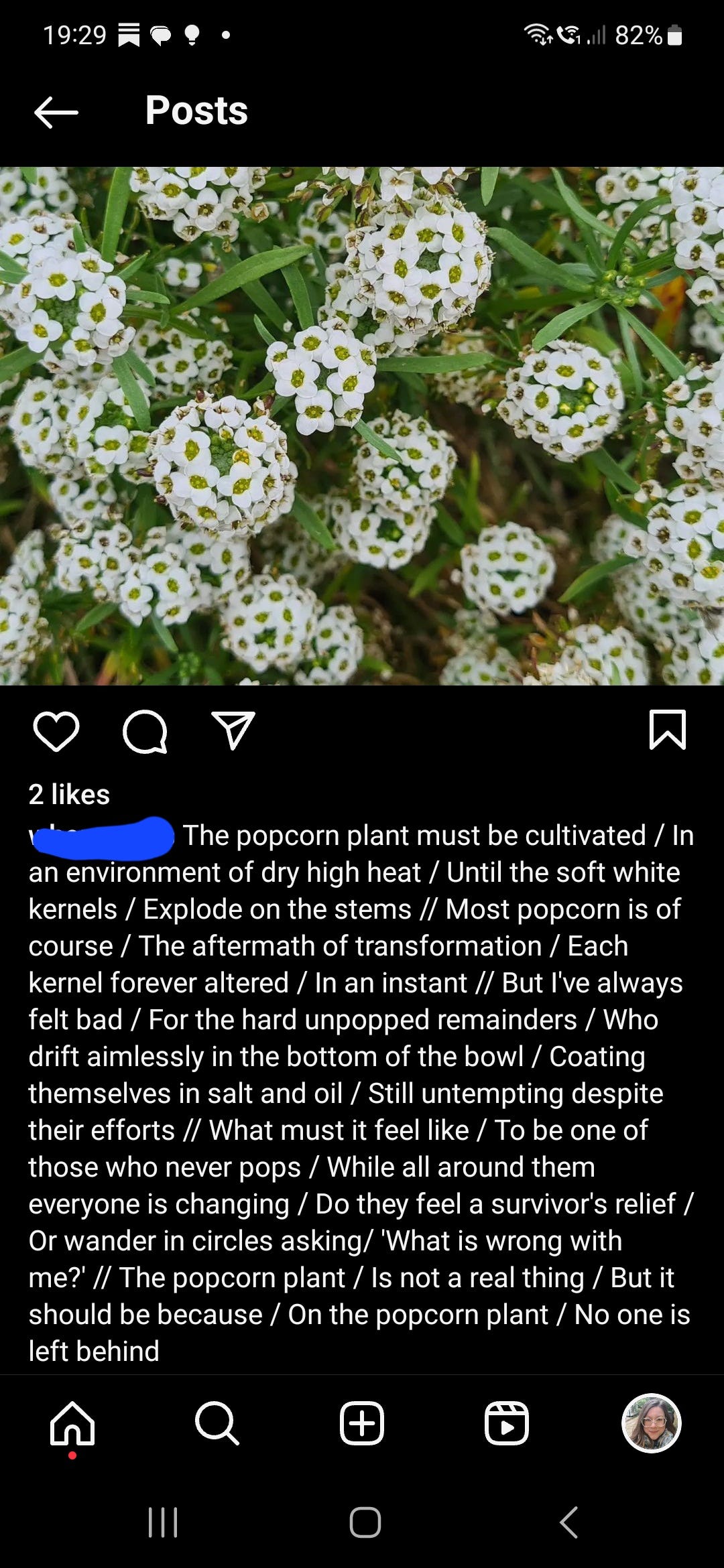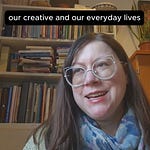I’m buzzing with creative energy as I write this, because I attended an online meetup tonight with the folks from my poetry collective. They are brilliant and inspiring individuals, and it was lovely to hear some of their work.
Poetry is a big part of my life now, but I lost my connection to it for many years. This post explores how I found that connection again, and offers some more project inspiration if you are feeling stuck on how to find your way into this medium.
In this video…
This video goes a bit deeper into the qualities of mystery, and explores how we can use everyday life to inspire poetry.
This touches on:
Giving the unconscious room to speak
Losing and reclaiming my relationship with poetry
Turning to poetry when I could no longer write plays
Embracing poetry’s expressive flexibility
Using photos and Instagram to inspire poetry
Letting the mundane inspire art (aka writing a poem about defrosting a freezer)
The importance of playfulness in unlocking mystery
Some additional project ideas
(Note: This was some content I originally prepared for the 2024 version of The Total Artist, but it feels just as relevant now, so I thought I would share it again!)
If you want to take a crack at writing a poem but aren’t sure where to start, here are some ideas to try / some things that have worked for me:
Try writing a haiku - these poems are only three lines, consisting of 5 / 7 / 5 syllables. This is where I started, and it’s a great entry point for the poetry-curious!
Make a list of words that sound nice together.
Brainstorm a collection of exciting titles - for a new project at work or a favourite recipe at home.
Draw from everyday life. I like to take the most mundane and unpoetic thing I can think of, and see if I can find something beautiful or meaningful within it. (See again: the poem I wrote about defrosting my freezer.)
Create an erasure poem - where you create the poem not by writing words but by crossing them out to find a message in the words that remain. There are some great examples from Austin Kleon. I particularly love Kate Baer’s work, in which she took misogynistic messages sent to her online and found her own powerful messages within them (Bookshop: UK link here; Amazon: UK link here / USA link here).
Let the emotion flow. Is there something you love? Something that makes you furious? See if you can find the words for it.
I have an entire series of poems inspired by learning a new word. I find that writing a poem about it helps me understand the thing and remember the word. (Here’s a new one that I wrote last year as an exercise for the Southbank New Poets Collective.)
For me, it’s particularly enjoyable to use a picture as inspiration and write out the idea sand images that come to mind. (You can either use a photo you find, or take them yourself! Here’s an example from my secret instagram. I like to write these on my phone in stream-of-consciousness style in the drowsy last minutes before I fall asleep.)
You can also take the opportunity to connect with poetry in other ways. Maybe you want to read some poetry - either something new, or something from your past - or send a voicenote to a friend with a line that makes you think of them.
Poetry can take so many forms. There will be something out there that speaks your language.
Poetry in action: what I was working on tonight (and what comes after the inspiration stage)
The first stage of creating poetry needs the release of writing without judgment. (You cannot skip this step!)
But after that, comes the transformative magic of editing.
For the online workshop I went to tonight, I brought along something that’s still a bit raw artistically. I actually love sharing early drafts of work, because things aren’t locked down yet, so there is the opportunity to make big and bold changes in response to feedback.
In this poem, I feel like I’ve captured the most important image that anchors the piece. But I’m still flailing around in parts of it to find language that feels as elegant and crisp as the last couple of lines. It was really wonderful to have other writers look at it with so much care and attention. They helped me untangle what is at the heart of this poem, and what kind of artistic choices will communicate this most effectively.
No one loves language in quite the same way that poets do.
There is nothing like a poetry workshop to make you appreciate the way a single word or dot of punctuation can matter. Tiny details can have a huge impact.
When I’m editing or offering feedback, I can’t always explain the reasoning behind my thoughts: why that line would be stronger broken in the middle, why this poem needs a wider page, why those words should be swapped. It’s a deeply instinctual process. I usually follow my artistic sense of direction, and then figure out the more intellectual/practical justifications.
We don’t always need reasons - that is the beauty of mystery.
At times, editing can feel a bit fiddly and frustrating. But when I keep a sense of playful detachment, I find I can really enjoy it. Digging into the deeper layers of as-yet-unrealised possibility feels like taking a two dimensional idea and making it three-dimensional. It’s a refusal to stop at the surface, to fall prey to impatience, or be content with the first idea that comes up.
During editing, I often discover symbols or connections or possibilities that I was not aware of in the earlier stages of writing - but they are there nevertheless.
Sharing work (particularly in a workshop with other artists) is an opportunity to look through others’ eyes to see these moments, but we can also find it by ourselves when we choose to sit with what we have created, keep looking at it, and keep trying new things just to see what happens.
So if you’ve got some poetic writing on the go - keep playing with it and see if you can find something surprising that you did not realise was there when you first wrote it.
The most important thing is to write - and to keep on writing.
This is where we find the magic moments where we can surprise ourselves - mystery in action.
For now,
Alli
Access Support: If you have access needs that I’m not currently meeting, please do drop me a line! (The best email is contact@ac-smith.com.) I’d really like to make this project available to anyone who wants to participate.













Share this post